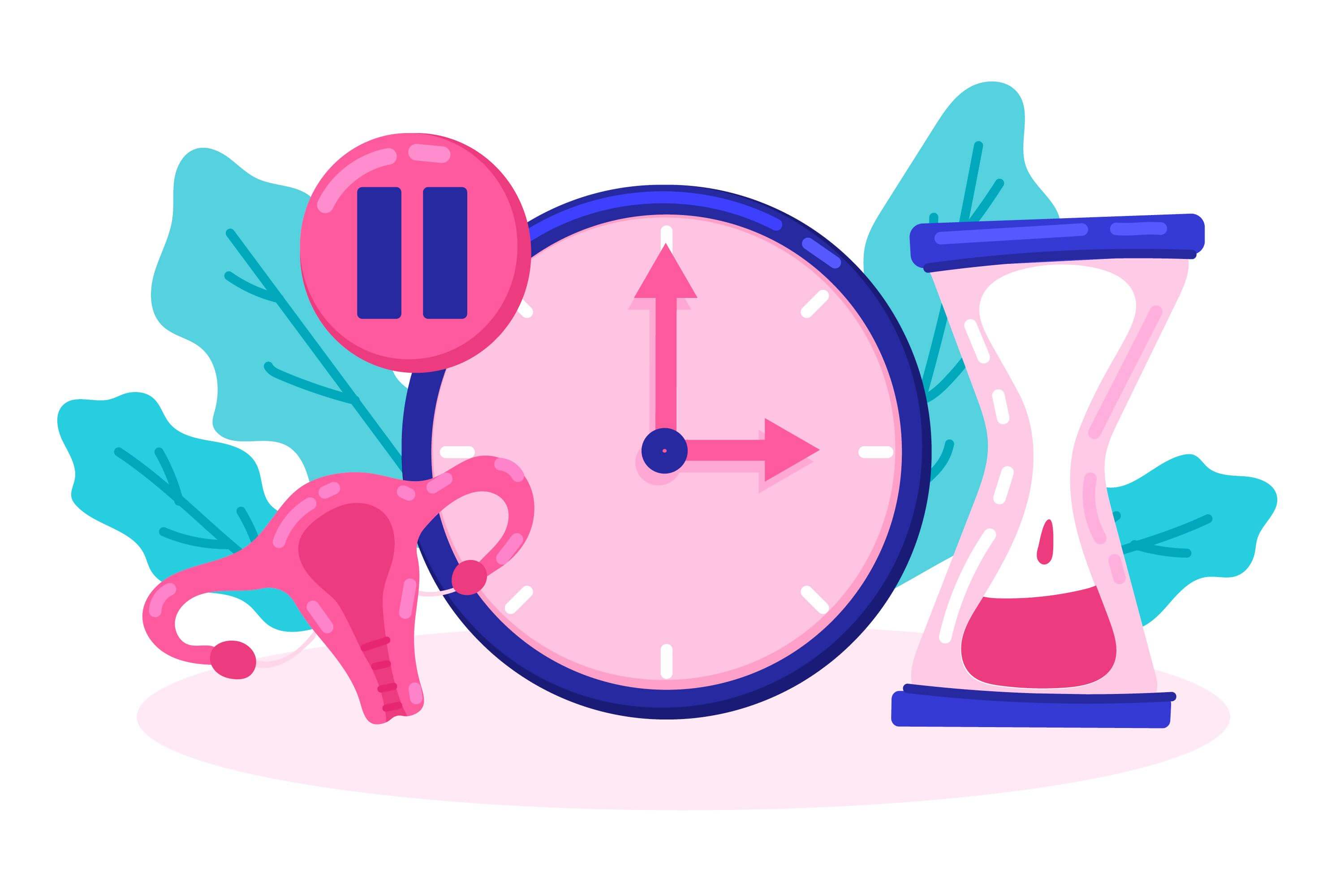Perimenopause Support Guide: What Every Woman Should Know

Perimenopause is the transitional stage preceding menopause. It is characterized by fluctuating hormones, especially oestrogen, which steadily decreases. Hot flashes, sleep issues, and changes in brain and sexual function are some of the symptoms that might accompany this period. It is a normal hormonal change, similar to puberty, yet it can still cause unpleasant sensations. Understanding these symptoms is essential for their management via therapy and lifestyle modifications.
What is perimenopause?
Perimenopause is when your body begins the transition to menopause. Your ovaries start to produce fewer hormones during this transition, which makes your menstrual cycle unpredictable. Your body is approaching the end of your reproductive years during the perimenopause. Although it's a normal and natural evolution, there are emotional and physical symptoms. You may experience discomfort or life disruption from some of these symptoms.
Perimenopause can start in your mid-30s or late 50s. While some women experience the perimenopause for a few years, others do so for a longer period. You can still become pregnant during perimenopause, even though your hormone levels are dropping and your monthly periods are unpredictable.
This phase ends when a woman hits menopause, a period of change. Menopause is the end of menstruation. It is officially reached when a woman goes 12 months without having a menstrual cycle.
Hormonal changes during perimenopause:
Declining oestrogen levels are the primary cause of the hormonal changes you go through during perimenopause. Oestrogen, which is essential for the upkeep of your reproductive system, is produced by your ovaries. Your ovaries also create progesterone, which is thrown off balance when oestrogen levels drop. Hormone levels are known to fluctuate during the perimenopause, rising and falling like a rollercoaster.
Your body produces so little oestrogen during menopause that your ovaries stop releasing eggs, or ovulation. You no longer get your period at this time, and you are no longer able to conceive.
How to know you are in perimenopause?
Everybody's body is unique, and every person experiences perimenopause symptoms differently.
Usually, irregular periods are the first indication of perimenopause. Menstrual cycles might change from being regular to occurring irregularly or not at all. The most typical menopausal symptoms, such as vaginal dryness and hot flashes, are also experienced by many women early in the transition.
Signs and symptoms of perimenopause:
Women experience a wide range of perimenopausal symptoms, which can be impacted by lifestyle choices, genetics, and general health. Typical signs and symptoms include:
Irregular Periods:
One of the earliest indicators of perimenopause is frequently a change in menstrual cycle patterns. The flow may get heavier or lighter, and periods may get longer or shorter.
Hot Flushes and Night Sweats:
It's normal to experience sudden, strong heat, which is frequently accompanied by flushing and perspiration. Fatigue and irritation might result from sleep disturbances caused by night sweats.
Mood Shifts:
Anxiety, despair, impatience, and mood swings can all be brought on by hormonal changes. Additionally, some women could become more sensitive to emotions.
Sleep disturbances:
Anxiety, night sweats, and other hormonally related conditions can cause insomnia, or trouble falling or staying asleep.
Changes in the Vagina and Urinary System:
Reduced oestrogen levels can cause dry vaginas, discomfort during sexual activity, and a higher risk of UTIs.
Brain fog:
Memory, recollection, focus, and concentration are all frequently affected in women. They could have trouble finding the right words, recalling names, or losing their train of thought.
Reduced Libido:
During the perimenopause, many women report feeling less arousal and sexual desire.
Weight Gain and Changes in Metabolism:
Weight gain, especially around the belly, might result from changes in metabolism.
Loss of Bone Density:
Due to oestrogen drop, osteoporosis risk may rise as a result of reduced bone density.

Perimenopause treatment strategy:
Although perimenopause is a normal biological condition, several treatments and lifestyle changes can help manage its symptoms. Improving quality of life and symptom relief are the objectives. These are a few typical methods:
-
Hormonal replacement therapy: By balancing oestrogen and progesterone levels, hormone replacement treatment (HRT) can improve mood, energy, sleep, and vaginal dryness while easing symptoms like hot flashes and night sweats.
-
Lifestyle Changes: A healthy diet, regular exercise, enough water intake, and stress-reduction methods like yoga and meditation can all help control symptoms and enhance general health.
-
Non-Hormonal Medications: Veoza is one of the non-hormonal treatment alternatives for menopausal symptoms.
-
Vaginal Oestrogen: Low-dose vaginal oestrogen products (creams, tablets, or rings) may be useful for treating vaginal dryness and pain.
-
Calcium and Vitamin D Supplements: In addition to weight-bearing activities, calcium and vitamin D supplements may help maintain bone health.
-
Herbal Supplements and Remedies: Black cohosh, evening primrose oil, and soy products are a few examples of herbal supplements that some women use to alleviate their symptoms. However, before beginning any new supplement, it is imperative to speak with a healthcare professional.
- Cognitive behavioural therapy, or CBT, is useful for treating perimenopausal depression, anxiety, and mood swings.
Lifestyle changes to manage perimenopause symptoms:
You might be able to manage your perimenopause symptoms at home. The following advice can help you manage your symptoms without using medicine:
- Consume a lot of lean protein, whole grains, fruits, veggies, and healthy fats.
- Exercise with weights, such as strength training, hiking, or walking.
- If you start to experience hot flushes, you can take off your clothes by dressing in layers.
- Maintain a cooler temperature in your home or use a fan.
- Prevent TV and computer screens and engage in calming activities before bed to improve your sleep hygiene.
- Avoid too much alcohol and coffee.
-
Take up stress-reduction methods like meditation.
- Don't use cigarettes or other tobacco products.
- Keep yourself at a healthy weight.
Things to avoid during perimenopause:
Perimenopause can be made worse by a variety of factors. Everyone is unique. You might discover that your symptoms worsen with particular foods or activities. Generally speaking, the following elements may exacerbate perimenopausal symptoms:
- consuming unhealthy foods, such as desserts and sugary drinks, or foods that are high in saturated fat. Perimenopausal hot flashes and weight fluctuations can be alleviated by eating more nutrient-dense foods.
- staying sedentary or avoiding exercise. Regular exercise has been demonstrated to help with mood swings, sleep issues, and energy levels.
- cigarette smoking or tobacco product use. Smoking can exacerbate vaginal dryness, cause early menopause, and lower bone density, according to studies.
Discuss your lifestyle and any symptoms you may be experiencing with your healthcare professional. They can suggest methods to enhance your general well-being and collaborate with you on a treatment strategy.
When to see a healthcare provider?
While irregular periods are typical and common during the perimenopause, irregular vaginal bleeding can also be caused by other diseases. Consult a healthcare professional to rule out further causes if any of the following apply to you:
- Large blood clots or extremely heavy periods are the results.
- Pads or tampons should be changed every one to two hours.
- The length of your periods is longer than normal by a few days.
- You bleed or stain in between periods.
- Sex causes you to bleed.
- Your periods are separated by fewer than 21 days.
Conclusion:
Women can navigate perimenopause with resilience and empowerment if they have the right information, support, and self-care techniques. By breaking the silence and seeking help, you can move through this stage with confidence, knowing you are not alone. Perimenopause is not just an end, but a beginning—a transition to a new phase of life.
References:
-
https://www.contemporaryobgyn.net/view/study-perimenopause-symptoms-common-in-women-as-young-as-30
-
https://www.mayoclinic.org/diseases-conditions/menopause/in-depth/hormone-therapy/ART-20046372


